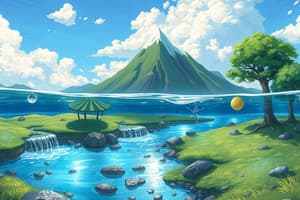Podcast
Questions and Answers
What is evaporation?
What is evaporation?
- Water that is in the ground
- Solid or liquid water that falls to the ground
- Liquid to gas & gain thermal energy (correct)
- Gas to liquid & loss thermal energy
What occurs during condensation?
What occurs during condensation?
- The change of state from a liquid to solid
- Solid or liquid water that falls to the ground
- Gas to liquid & loss thermal energy (correct)
- Water from precipitation that flows on Earth's surface
What is precipitation?
What is precipitation?
Solid or liquid water that falls to the ground
What is runoff?
What is runoff?
How long can a person survive without water?
How long can a person survive without water?
How long can a person live without food?
How long can a person live without food?
How does water help an organism's body?
How does water help an organism's body?
What two things are mostly made of water?
What two things are mostly made of water?
How much of the human body is water?
How much of the human body is water?
What is groundwater?
What is groundwater?
What is melting?
What is melting?
What is sublimation?
What is sublimation?
What is freezing?
What is freezing?
What is deposition?
What is deposition?
What is an aquifer?
What is an aquifer?
What does the water table refer to?
What does the water table refer to?
What does a water particle look like?
What does a water particle look like?
On a piece of paper, draw a ______ and label it!
On a piece of paper, draw a ______ and label it!
What is the water cycle?
What is the water cycle?
Flashcards are hidden until you start studying
Study Notes
Water Cycle Key Concepts
- Evaporation: Transition from liquid to gas where water gains thermal energy.
- Condensation: Conversion of gas to liquid where water loses thermal energy.
- Precipitation: Water, in solid or liquid form, falls to Earth (e.g., rain, snow).
- Runoff: Water that flows over the Earth's surface following precipitation and snowmelt.
- Collection: Accumulation of water in bodies like rivers, lakes, and oceans.
Water Survival Facts
- A person can survive without water for only a few days.
- Humans can live over a month without food.
Importance of Water in Organisms
- Water is essential for transporting substances to tissues and organs, occurring solely within cells.
- Both plants and animals primarily consist of water.
Water Composition in Humans
- Over half of the human body is composed of water.
Groundwater and Aquifers
- Groundwater: Water that infiltrates the soil, filling cracks in rocks and serving as a source for springs and wells.
- Aquifer: Saturated loose rock or soil that holds groundwater.
Changes of State in Water
- Melting: Changes from solid to liquid when gaining thermal energy.
- Sublimation: Transitions from solid to gas without becoming liquid, occurring with added thermal energy.
- Freezing: Changes from liquid to solid when losing thermal energy.
- Deposition: Conversion from gas to solid when a gas loses thermal energy.
Water Cycle Mechanics
- Water Table: Depth where rock and soil are saturated with water; marks the upper level of aquifers.
- The water cycle is a continuous natural process where water circulates through different states above, on, and below Earth's surface.
Water Molecule Structure
- A water particle consists of two hydrogen atoms and one oxygen atom, resembling Mickey Mouse ears with the oxygen atom as the larger central portion.
Studying That Suits You
Use AI to generate personalized quizzes and flashcards to suit your learning preferences.




